Management Accounting Report: Analysis of Roles and Tools
VerifiedAdded on 2023/06/18
|7
|1075
|434
Report
AI Summary
This report delves into the realm of management accounting, elucidating its significance in organizational decision-making. It begins with an executive summary, followed by an introduction that defines management accounting and its purpose. The main body of the report provides an analysis of both traditional and contemporary roles of management accounting, contrasting their approaches and impacts. It then explores the specific roles of management accountants within organizations, including long-term and short-term planning, developing management information systems, and participating in the management process. The report also examines management accounting tools used for strategic decision-making, such as budgetary control and statistical techniques. The report concludes by summarizing the key findings and emphasizing the importance of management accounting for businesses. References to relevant academic sources are also included.

Paraphrase This Document
Need a fresh take? Get an instant paraphrase of this document with our AI Paraphraser
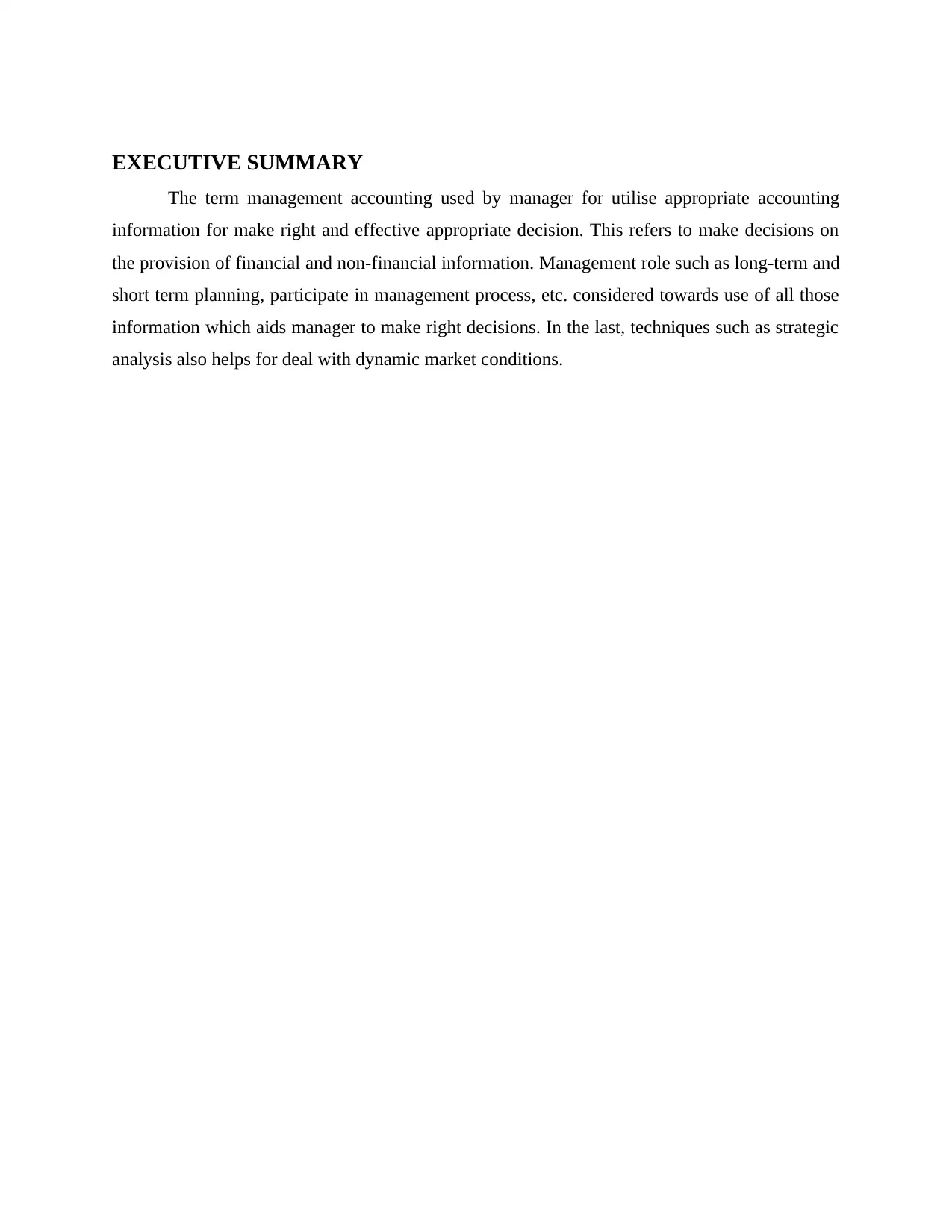
EXECUTIVE SUMMARY
The term management accounting used by manager for utilise appropriate accounting
information for make right and effective appropriate decision. This refers to make decisions on
the provision of financial and non-financial information. Management role such as long-term and
short term planning, participate in management process, etc. considered towards use of all those
information which aids manager to make right decisions. In the last, techniques such as strategic
analysis also helps for deal with dynamic market conditions.
The term management accounting used by manager for utilise appropriate accounting
information for make right and effective appropriate decision. This refers to make decisions on
the provision of financial and non-financial information. Management role such as long-term and
short term planning, participate in management process, etc. considered towards use of all those
information which aids manager to make right decisions. In the last, techniques such as strategic
analysis also helps for deal with dynamic market conditions.
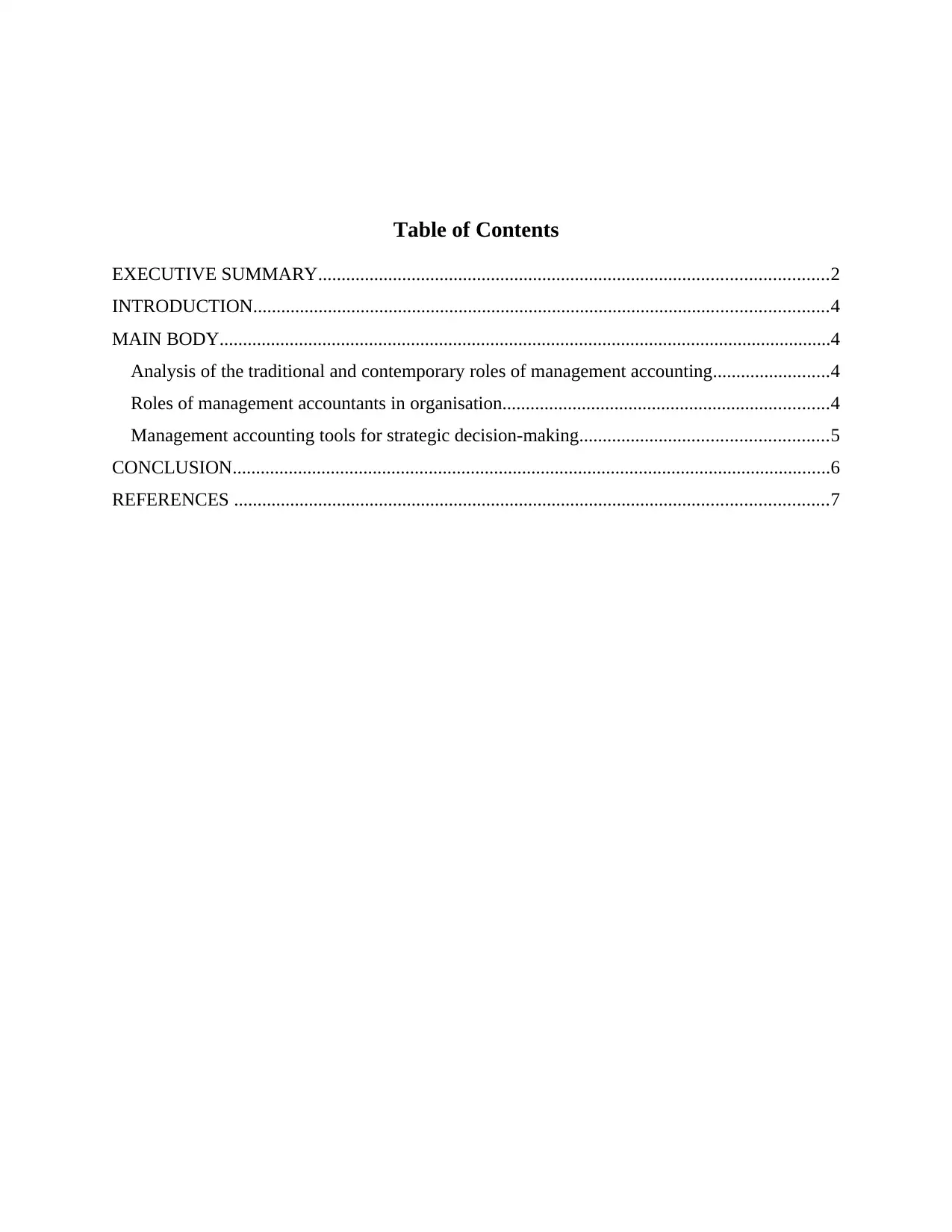
Table of Contents
EXECUTIVE SUMMARY.............................................................................................................2
INTRODUCTION...........................................................................................................................4
MAIN BODY...................................................................................................................................4
Analysis of the traditional and contemporary roles of management accounting.........................4
Roles of management accountants in organisation......................................................................4
Management accounting tools for strategic decision-making.....................................................5
CONCLUSION................................................................................................................................6
REFERENCES ...............................................................................................................................7
EXECUTIVE SUMMARY.............................................................................................................2
INTRODUCTION...........................................................................................................................4
MAIN BODY...................................................................................................................................4
Analysis of the traditional and contemporary roles of management accounting.........................4
Roles of management accountants in organisation......................................................................4
Management accounting tools for strategic decision-making.....................................................5
CONCLUSION................................................................................................................................6
REFERENCES ...............................................................................................................................7
⊘ This is a preview!⊘
Do you want full access?
Subscribe today to unlock all pages.

Trusted by 1+ million students worldwide
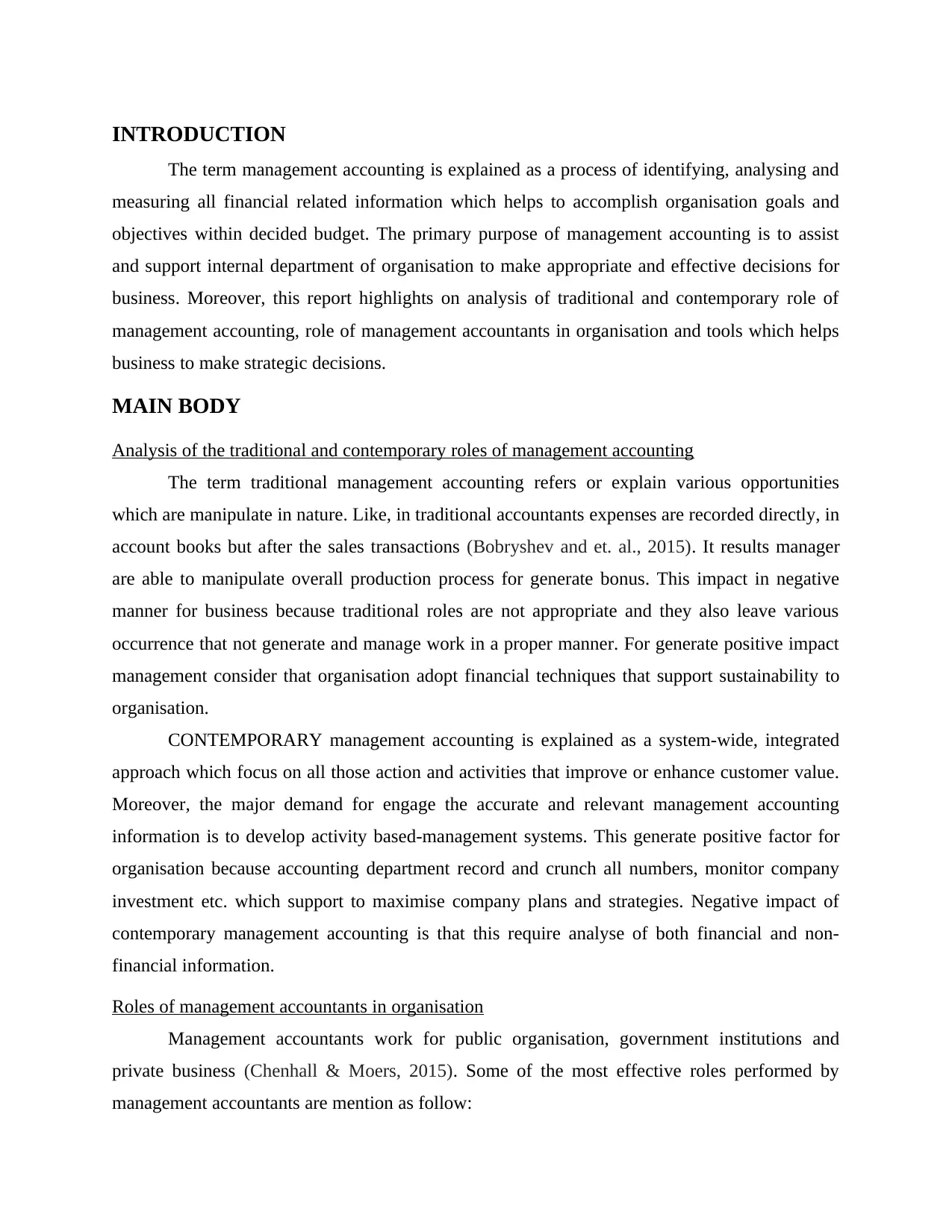
INTRODUCTION
The term management accounting is explained as a process of identifying, analysing and
measuring all financial related information which helps to accomplish organisation goals and
objectives within decided budget. The primary purpose of management accounting is to assist
and support internal department of organisation to make appropriate and effective decisions for
business. Moreover, this report highlights on analysis of traditional and contemporary role of
management accounting, role of management accountants in organisation and tools which helps
business to make strategic decisions.
MAIN BODY
Analysis of the traditional and contemporary roles of management accounting
The term traditional management accounting refers or explain various opportunities
which are manipulate in nature. Like, in traditional accountants expenses are recorded directly, in
account books but after the sales transactions (Bobryshev and et. al., 2015). It results manager
are able to manipulate overall production process for generate bonus. This impact in negative
manner for business because traditional roles are not appropriate and they also leave various
occurrence that not generate and manage work in a proper manner. For generate positive impact
management consider that organisation adopt financial techniques that support sustainability to
organisation.
CONTEMPORARY management accounting is explained as a system-wide, integrated
approach which focus on all those action and activities that improve or enhance customer value.
Moreover, the major demand for engage the accurate and relevant management accounting
information is to develop activity based-management systems. This generate positive factor for
organisation because accounting department record and crunch all numbers, monitor company
investment etc. which support to maximise company plans and strategies. Negative impact of
contemporary management accounting is that this require analyse of both financial and non-
financial information.
Roles of management accountants in organisation
Management accountants work for public organisation, government institutions and
private business (Chenhall & Moers, 2015). Some of the most effective roles performed by
management accountants are mention as follow:
The term management accounting is explained as a process of identifying, analysing and
measuring all financial related information which helps to accomplish organisation goals and
objectives within decided budget. The primary purpose of management accounting is to assist
and support internal department of organisation to make appropriate and effective decisions for
business. Moreover, this report highlights on analysis of traditional and contemporary role of
management accounting, role of management accountants in organisation and tools which helps
business to make strategic decisions.
MAIN BODY
Analysis of the traditional and contemporary roles of management accounting
The term traditional management accounting refers or explain various opportunities
which are manipulate in nature. Like, in traditional accountants expenses are recorded directly, in
account books but after the sales transactions (Bobryshev and et. al., 2015). It results manager
are able to manipulate overall production process for generate bonus. This impact in negative
manner for business because traditional roles are not appropriate and they also leave various
occurrence that not generate and manage work in a proper manner. For generate positive impact
management consider that organisation adopt financial techniques that support sustainability to
organisation.
CONTEMPORARY management accounting is explained as a system-wide, integrated
approach which focus on all those action and activities that improve or enhance customer value.
Moreover, the major demand for engage the accurate and relevant management accounting
information is to develop activity based-management systems. This generate positive factor for
organisation because accounting department record and crunch all numbers, monitor company
investment etc. which support to maximise company plans and strategies. Negative impact of
contemporary management accounting is that this require analyse of both financial and non-
financial information.
Roles of management accountants in organisation
Management accountants work for public organisation, government institutions and
private business (Chenhall & Moers, 2015). Some of the most effective roles performed by
management accountants are mention as follow:
Paraphrase This Document
Need a fresh take? Get an instant paraphrase of this document with our AI Paraphraser
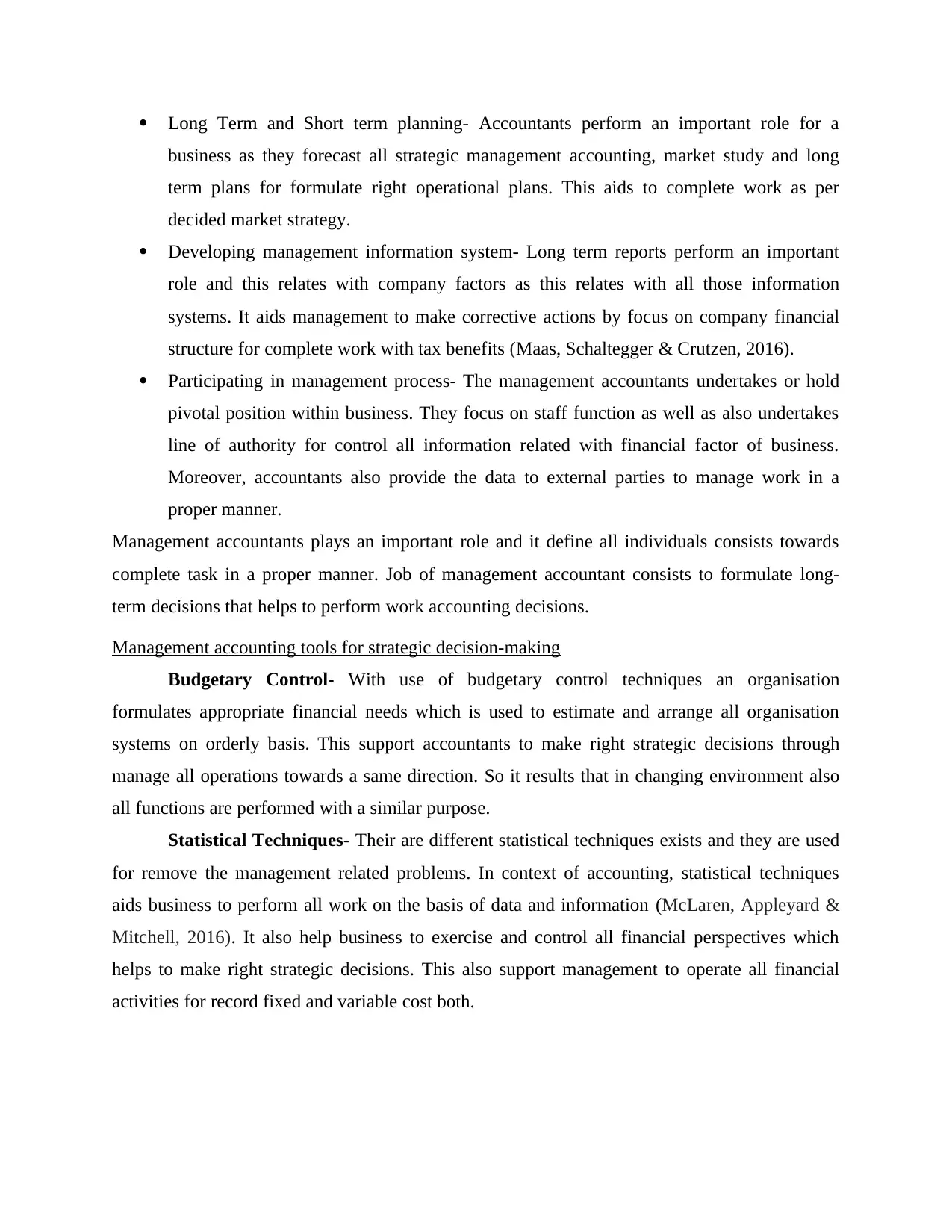
Long Term and Short term planning- Accountants perform an important role for a
business as they forecast all strategic management accounting, market study and long
term plans for formulate right operational plans. This aids to complete work as per
decided market strategy.
Developing management information system- Long term reports perform an important
role and this relates with company factors as this relates with all those information
systems. It aids management to make corrective actions by focus on company financial
structure for complete work with tax benefits (Maas, Schaltegger & Crutzen, 2016).
Participating in management process- The management accountants undertakes or hold
pivotal position within business. They focus on staff function as well as also undertakes
line of authority for control all information related with financial factor of business.
Moreover, accountants also provide the data to external parties to manage work in a
proper manner.
Management accountants plays an important role and it define all individuals consists towards
complete task in a proper manner. Job of management accountant consists to formulate long-
term decisions that helps to perform work accounting decisions.
Management accounting tools for strategic decision-making
Budgetary Control- With use of budgetary control techniques an organisation
formulates appropriate financial needs which is used to estimate and arrange all organisation
systems on orderly basis. This support accountants to make right strategic decisions through
manage all operations towards a same direction. So it results that in changing environment also
all functions are performed with a similar purpose.
Statistical Techniques- Their are different statistical techniques exists and they are used
for remove the management related problems. In context of accounting, statistical techniques
aids business to perform all work on the basis of data and information (McLaren, Appleyard &
Mitchell, 2016). It also help business to exercise and control all financial perspectives which
helps to make right strategic decisions. This also support management to operate all financial
activities for record fixed and variable cost both.
business as they forecast all strategic management accounting, market study and long
term plans for formulate right operational plans. This aids to complete work as per
decided market strategy.
Developing management information system- Long term reports perform an important
role and this relates with company factors as this relates with all those information
systems. It aids management to make corrective actions by focus on company financial
structure for complete work with tax benefits (Maas, Schaltegger & Crutzen, 2016).
Participating in management process- The management accountants undertakes or hold
pivotal position within business. They focus on staff function as well as also undertakes
line of authority for control all information related with financial factor of business.
Moreover, accountants also provide the data to external parties to manage work in a
proper manner.
Management accountants plays an important role and it define all individuals consists towards
complete task in a proper manner. Job of management accountant consists to formulate long-
term decisions that helps to perform work accounting decisions.
Management accounting tools for strategic decision-making
Budgetary Control- With use of budgetary control techniques an organisation
formulates appropriate financial needs which is used to estimate and arrange all organisation
systems on orderly basis. This support accountants to make right strategic decisions through
manage all operations towards a same direction. So it results that in changing environment also
all functions are performed with a similar purpose.
Statistical Techniques- Their are different statistical techniques exists and they are used
for remove the management related problems. In context of accounting, statistical techniques
aids business to perform all work on the basis of data and information (McLaren, Appleyard &
Mitchell, 2016). It also help business to exercise and control all financial perspectives which
helps to make right strategic decisions. This also support management to operate all financial
activities for record fixed and variable cost both.
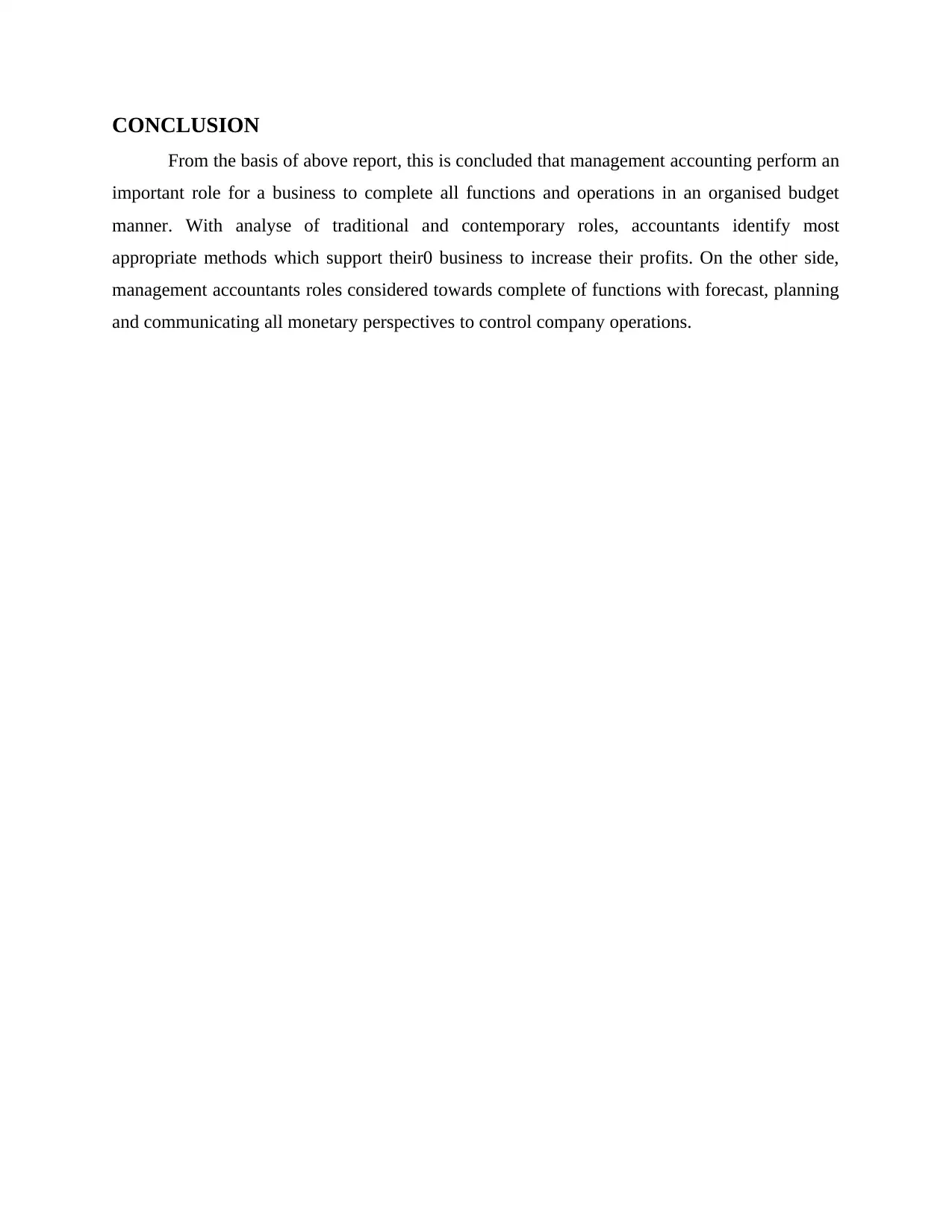
CONCLUSION
From the basis of above report, this is concluded that management accounting perform an
important role for a business to complete all functions and operations in an organised budget
manner. With analyse of traditional and contemporary roles, accountants identify most
appropriate methods which support their0 business to increase their profits. On the other side,
management accountants roles considered towards complete of functions with forecast, planning
and communicating all monetary perspectives to control company operations.
From the basis of above report, this is concluded that management accounting perform an
important role for a business to complete all functions and operations in an organised budget
manner. With analyse of traditional and contemporary roles, accountants identify most
appropriate methods which support their0 business to increase their profits. On the other side,
management accountants roles considered towards complete of functions with forecast, planning
and communicating all monetary perspectives to control company operations.
⊘ This is a preview!⊘
Do you want full access?
Subscribe today to unlock all pages.

Trusted by 1+ million students worldwide
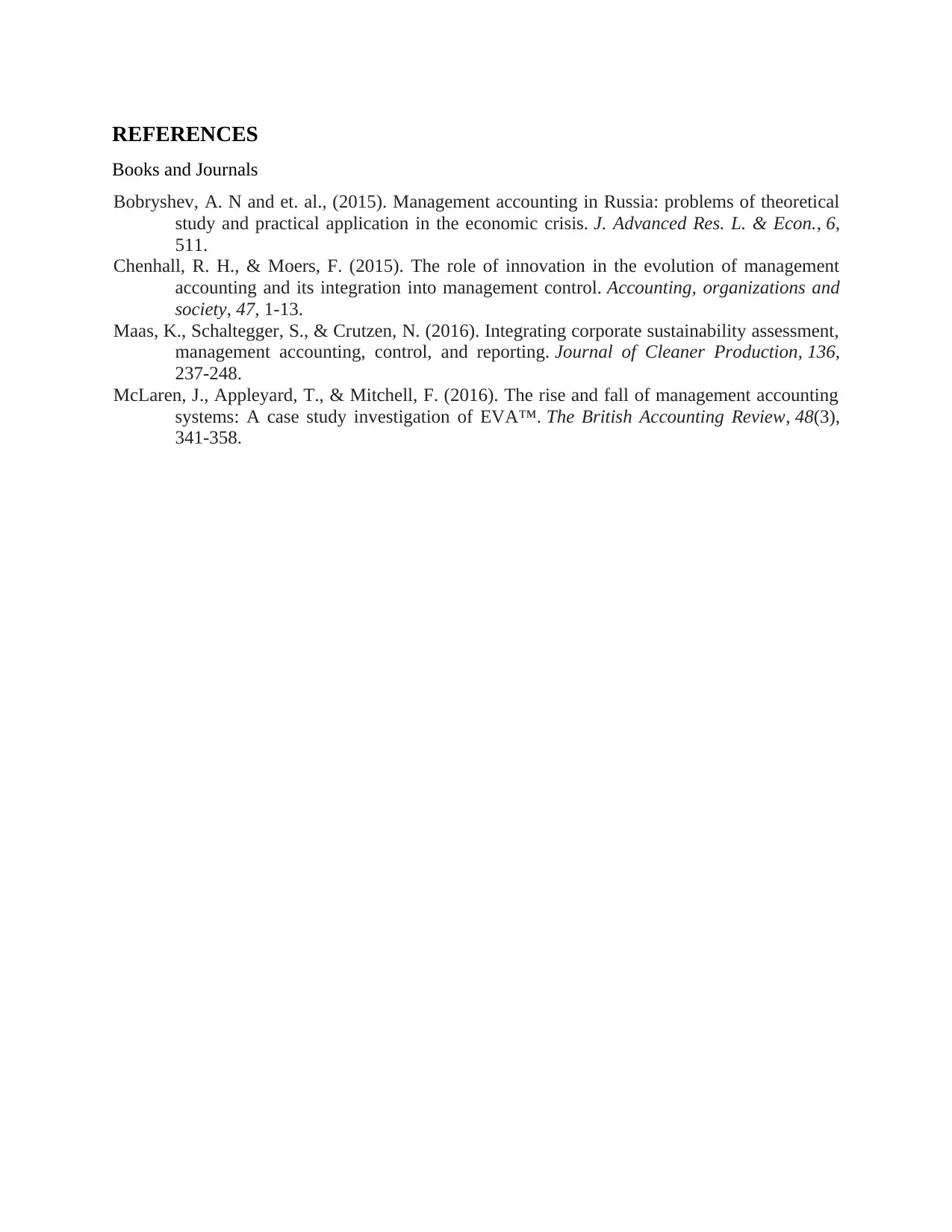
REFERENCES
Books and Journals
Bobryshev, A. N and et. al., (2015). Management accounting in Russia: problems of theoretical
study and practical application in the economic crisis. J. Advanced Res. L. & Econ., 6,
511.
Chenhall, R. H., & Moers, F. (2015). The role of innovation in the evolution of management
accounting and its integration into management control. Accounting, organizations and
society, 47, 1-13.
Maas, K., Schaltegger, S., & Crutzen, N. (2016). Integrating corporate sustainability assessment,
management accounting, control, and reporting. Journal of Cleaner Production, 136,
237-248.
McLaren, J., Appleyard, T., & Mitchell, F. (2016). The rise and fall of management accounting
systems: A case study investigation of EVA™. The British Accounting Review, 48(3),
341-358.
Books and Journals
Bobryshev, A. N and et. al., (2015). Management accounting in Russia: problems of theoretical
study and practical application in the economic crisis. J. Advanced Res. L. & Econ., 6,
511.
Chenhall, R. H., & Moers, F. (2015). The role of innovation in the evolution of management
accounting and its integration into management control. Accounting, organizations and
society, 47, 1-13.
Maas, K., Schaltegger, S., & Crutzen, N. (2016). Integrating corporate sustainability assessment,
management accounting, control, and reporting. Journal of Cleaner Production, 136,
237-248.
McLaren, J., Appleyard, T., & Mitchell, F. (2016). The rise and fall of management accounting
systems: A case study investigation of EVA™. The British Accounting Review, 48(3),
341-358.
1 out of 7
Related Documents
Your All-in-One AI-Powered Toolkit for Academic Success.
+13062052269
info@desklib.com
Available 24*7 on WhatsApp / Email
![[object Object]](/_next/static/media/star-bottom.7253800d.svg)
Unlock your academic potential
Copyright © 2020–2026 A2Z Services. All Rights Reserved. Developed and managed by ZUCOL.




